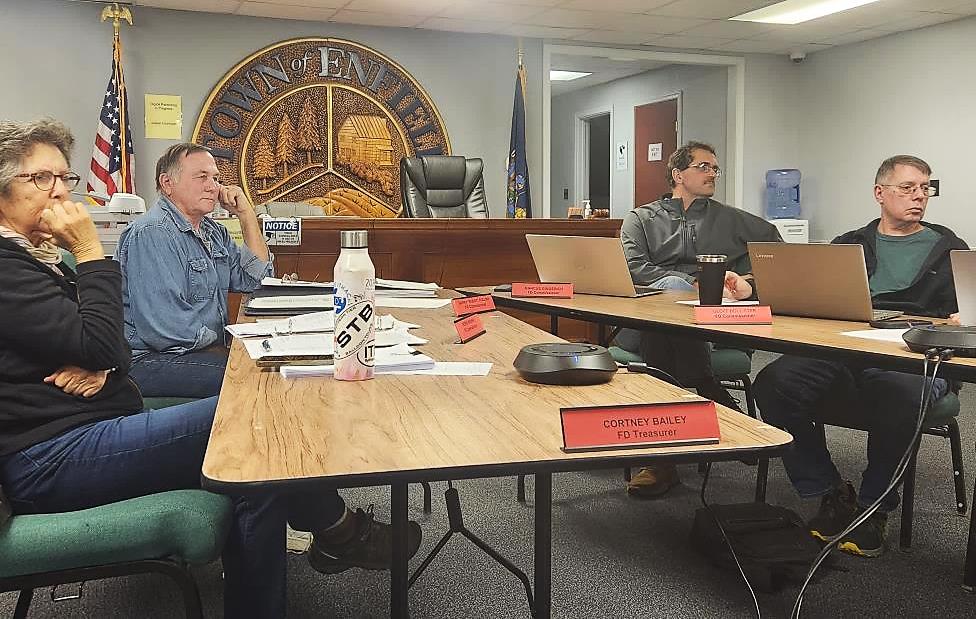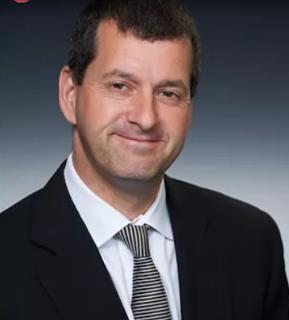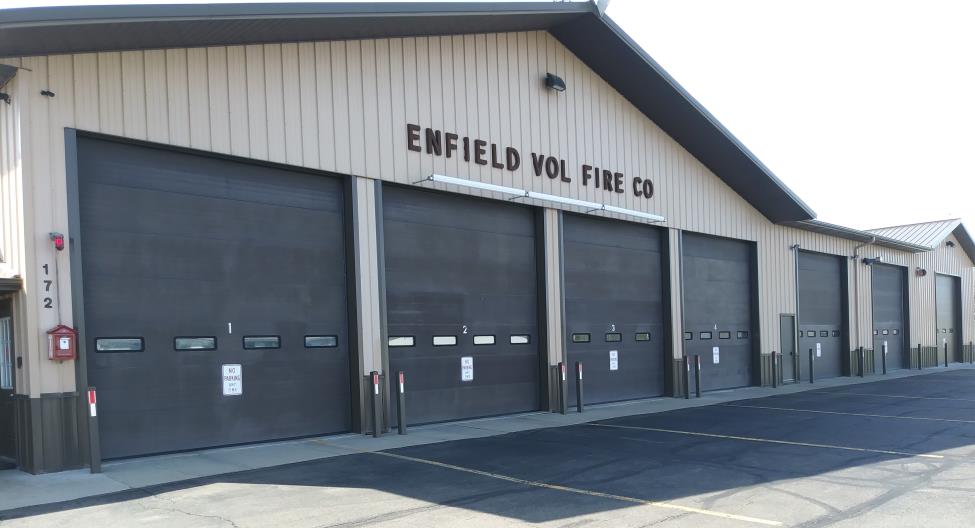Clinging to a thread, Fire Commissioners bind ballot tight for upcoming election
by Councilperson Robert Lynch; December 5, 2023
It’s become the new Enfield standard: One person, one-fifth of a vote.
At the end of a tortuous, arguably chaotic, frequently deadlocked, meeting, one in which it took nearly three hours to answer what should have been a no-brainer of a question—and answer it the wrong way, in the opinion of some— the Enfield Board of Fire Commissioners Monday voted 3-1 to limit each Enfield voter to just one ballot choice in the December 12th annual election for Fire Commissioners, one in which five Commissioners, the entire Board, will be seated, each to serve terms running for up to half a decade.

In the process, the Commissioners tossed out the common-sense alternative. It was a choice opposed by their attorney. It would have allowed each voter to make up to five selections from the ten-candidate slate. By either method, winners would be assigned to terms of varying lengths based on the total number of votes each received. The ten-member list of candidates was announced last week.
And in the height of ironies, Monday’s vote would likely have tipped in the opposite direction—toward each voter being allowed five votes—had Board of Commissioners’ Chairman Jim Mathews attended the meeting in person, rather than be traveling, appearing only via Zoom, and thereby finding himself disqualified from casting a vote.
“It seems to match the intent of the state,” Mathews opined at the long meeting’s start, stating his support of the five-votes-for-five-candidates option. “I’d rather we err on the side of enfranchisement, rather than being unfair to the voters of Enfield.”
“I absolutely agree; five votes per voter is logical and absolutely right,” Commissioner Marcus Gingerich echoed during his opening moments of Monday’s discussion. But Gingerich harbored reservations, reservations that eventually turned his vote around.
“We’re suddenly deciding a ballot,” Gingerich cautioned. “We’re making up election rules not spelled out in the law. We’re not a legislative body. We’re not a judicial body.”
And those concerns, voiced most often by Gingerich, but eventually shared by two others, made the difference. After first splitting two-to-two (Mathews could not vote) on a motion to permit five-candidates-per-voter during balloting in next week’s Commissioners election, the Board reconsidered and supported single-candidate voting, three-votes-to-one. As the Board left it, we each get just one choice per voter.
It was Commissioner Geoff Hollister, who after much indecision and hours of agonized Board member debate, reversed course and upended the outcome.
“Maybe the law is not where it needs to be,” Hollister readily conceded. “I think it’s terrible. I think it’s absolutely rotten. It’s a disservice to the Town. But I’m not a lawyer. And we can’t change the law.” Restricting voters to a single choice, he said, “is about how we’re going to get five Commissioners elected next week.”
Maybe so. Or maybe not. The “gray area” of law, to which Chairman Mathews referenced numerous times, is truly that. When state legislators drafted the statute that controls next week’s election—Section 174 (2) of New York Town Law—they neglected to specify whether a voter gets to cast one vote or five votes for five new Commissioners in a newly-established Fire District’s first-ever election. Such elections are electoral rarities, occurring once-only in a Fire District’s history. In Enfield, where the Town Board established its new Fire District just last summer, the situation will occur next week and never again.
And because interpretation of the ambiguous, unartfully-worded statute would become, as a judge would define it, a “case of first impression,” an aggrieved party could challenge the Board of Commissioners’ Monday decision in court. And the party could also ask the judge to enjoin next week’s election, delay it indefinitely until that judge decides the case’s merits.
What swayed the Board most persuasively Monday to vote the way its majority chose to vote was the advice of its attorney, Fire District counsel Brad Pinsky. The Enfield Town Board recruited the Syracuse-area attorney last spring to bring the Fire District into fruition. Pinsky was held on by the Board of Commissioners’ interim members when the Commissioners organized in August.
Pinsky did not attend Monday’s meeting. Instead, he sent his junior associate, Zach Longstreth, to zoom in. Yet Pinsky had purportedly shared his opinions with Commissioners previously, either in a written memo not yet made public, or in direct discussions with a couple of members at an unpublicized training session in Enfield last week.

Clinging to the thinnest of legal threads—an obscure, hardly on-point New York Attorney General’s opinion, an argument that if cited by a first-year law student in a legal memo might likely earn him a failing grade—Pinsky purportedly asserted that legislators never intended for any voter to ballot for multiple candidates to fill multiple seats in a single election; not unless a Town Board explicitly adopted first a local law to enable such practice. Enfield has not done so, and it’s too late for the Town Board to do so now.
“Then how did I just get elected,” this Town Councilperson, Robert Lynch, spoke up, directing his question at Pinsky’s ill-prepared, online stand-in, Longstreth.
While this writer may have run unopposed in the latest election last month, four years ago both he and then Councilperson-elect Stephanie Redmond each obtained the two-highest number of votes in a three-way election for two Town Board seats. They were elected; the third candidate was not. Voters in that election and in this most recent one did not choose a single candidate for a single Councilperson’s appointment. Rather, each candidate serves Enfield at-large. And as with the Fire Commissioners, Town Councilperson’s seats are indistinguishable.
What in this writer’s opinion appears to have occurred is that Brad Pinsky chose to stretch an inapt, off-topic, misapplied legal opinion—not even a court decision—beyond its acceptable limits. The underlying statute is silent. Case law on the legal matter simply does not exist. All sides admit both points. Yet Pinsky’s threadbare legal conclusion won the moment Monday night. At least it did for a slim Commissioners’ majority.
“Brad is our attorney. That’s what we pay him for,” Fire Commissioner and Enfield Highway Superintendent Barry “Buddy” Rollins told the meeting. “He’s saying the way it should be done. That’s what we pay him for.”
Rollins became the meeting’s strongest defender of the one-choice-only option. And a keen political strategist might discern an ulterior motive behind Rollins’ advocacy. Buddy’s running hard for election, one of ten seeking the five Fire Commissioner positions for initial terms ranging from one to five years. The candidate who receives the most votes in the December 12th election secures a five-year term. Lengths of terms descend in rank order, with the fifth-place finisher getting just a single year in office. Additionally, Rollins has become the most outspoken critic of the Enfield fire service among any of the candidates running. If procedures permit fellow critics to vote for one person and one person alone, Rollins’ allies would likely choose him. Machiavelli would get the point.
“How do other fire districts do it?” Commissioner Robyn Wishna asked. Wishna backed the five-candidate vote option during the Commissioners’ first attempt at settling the matter. And she stood consistent. Wishna became the only holdout against the final decision to permit just one candidate per voter.
But for Commissioners, finding practical precedent proved as difficult as mining for legal authority. Fire District formation is so rare, rarer still for districts like Enfield’s, where district boundaries are coterminous with those of the town. We’re told Pinsky’s examples were drawn from different situations.
This is an “enormous mistake,” Wishna advised colleagues prior to their final vote. It’s a “disservice on voters” and does “not serve our Town or anybody well.”
Wishna begged fellow Commissioners for more time—even just 24 hours—for her to perform more research, to ask other attorneys for their opinions, and to query other fire districts. But Mathews prodded colleagues for quick action. He noted the election was just eight days away. And the Chair brushed off suggestions that the Board table a revote until Mathews’ personal return, a time when presumably he could break the deadlock. Mathews said he wouldn’t be back in Enfield until Thursday night.
“Does it make common sense to vote for five out of ten?” Wishna asked. Clearly, she thought it did.
But as the saying goes, “the law is an ass.” And here, apparently both Pinsky and his junior associate prefer to steer in a direction far apart from Wishna’s common sense.
“It’s not an uninformed interpretation of the law,” Longstreth said of the legal theory his boss had conjured up.
Yet, for argument’s sake, might it indeed be “uninformed?” According to information shared second-hand at Monday’s meeting, Brad Pinsky places his legal logic solely upon a long-ago Attorney General’s opinion that rejected an attempt by a governing body in Port Chester, New York to establish “cumulative voting.” The A.G. supposedly held that cumulative voting would only be permitted should a Town Board first adopt a local law to sanction the practice.
But quite simply, what Wishna supports in Enfield is not “cumulative voting,” at least not as it’s customarily defined. “Cumulative voting” is when procedures allow a single voter to ballot for multiple seats on a multi-member board by voting multiple times for the same candidate. Some advocate the practice as a tool to enhance minority interests—and minority candidates.

That’s not what’s proposed in Enfield. In fact, in a strange way, one could argue that what the Board of Fire Commissioners adopted Monday is a backhanded attempt at cumulative voting. Voting for just one candidate when five seats are at stake could strengthen the chances for a minority-view outlier when his supporters, given the fewer number of votes cast overall, could pile-on to his support. (Think Rollins.)
“I think the law’s not great here,” Jim Mathews conceded, as the three-hour back-and-forth tussle of indecision and deadlock headed toward its finale.
“It’s a tough place for all of us to be in,” Mathews continued, speaking shortly before he called the vote in which he could not take part. “I believe that the law as written is a disservice to anyone in any place that is creating a fire district for the first time.”
And though he admitted he’d be willing to “roll the dice” and test the law with the five-candidate option, Mathews, in the end, pulled back, leaning on the attorney’s opinion, for whatever value it may hold.
“The law is badly written,” Mathews said. “It’s badly drafted. There is a (donut) hole. I think it’s dumb law.” Nonetheless, he conceded, the “safest, most conservative” approach “is to go with the attorney in the advice that he’s given us.”
Wishna made a final plea for more time. “Discussion’s over,” Rollins fired back, taking the moment to call out both Wishna and this writer for allegedly colluding to advance Wishna’s favored position. (At a couple of times during the meeting, this writer had handed Wishna copies of relevant state law, when everyone else, including lawyer Longstreth, appeared clueless.)
The vote was called: Rollins, Gingerich, and now Hollister supported just one choice per voter. Wishna voted no.
****
But while the meat of the meeting had been consumed, the meeting was not over quite yet. From his online perch, Jim Mathews read for all to hear an email he’d presumably just received from the non-attending lawyer, Brad Pinsky:
“Brad to Robyn: When did you graduate from law school?”
The comment went unanswered. Meeting adjourned.
Weigh your choice carefully in next Tuesday’s Fire Commissioners’ election. It’s a choice with dire limits. You can choose only one. Unless someone goes to court.
###

